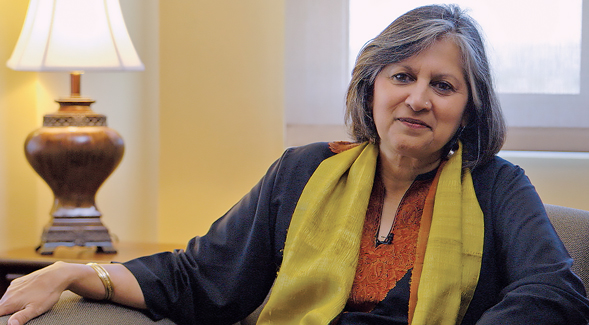SDSU Womens Studies Professor to Spend Fulbright Year in India
Huma Ahmed-Ghosh received a Fulbright award to study the effects of religious tensions on young adults.

Updated May 16, 2018, 7:30 p.m.
India is on course to become the most populous country in the world within a decade, and possibly to surpass China in GDP growth. Those factors point to a more prominent global role for India as the 21st century unfolds.
But beneath the advances, festering anti-Muslim hostility threatens to trigger serious internal turmoil throughout India. More than a dozen mob lynchings have been committed against Muslims in the last three years with little public comment from the government of Prime Minister Narendra Modi.
San Diego State University professor Huma Ahmed-Ghosh has witnessed the anti-Muslim violence escalate since the 1990s during annual visits to her parents’ home in Delhi. In August, she will begin a year-long Fulbright Scholar appointment to study the effects of increasing religious tensions on young Muslim women in India.
The rhetoric of terrorism
Ahmed-Ghosh, an anthropologist by training and a professor of women’s studies at SDSU, will interview 18 to 25-year-old Indian women about how the current environment has shaped their self-image and relationships, specifically their relationships to other women within and outside their families. She anticipates finding a “stronger sense of Muslim identity” in these young adults.“As children, many of them have faced bullying in school and public intimidation,” Ahmed-Ghosh said. “For the current government, it’s a convenient time to use the rhetoric of terrorism to play into historically embedded anti-Muslim sentiments.”
Abandonment without alimony
Also of interest to Ahmed-Ghosh is the impact of a recent Indian Supreme Court decision and subsequent legislation to reverse one of the country’s most controversial practices. Triple talaq allows a Muslim man to legally divorce his wife by stating the word talaq (divorce) three times in oral, written, or more recently, electronic form.“Muslim women’s groups have been fighting this all over Asia. It’s abandonment without alimony,” said Ahmed-Ghosh, who teaches classes about women in Muslim societies. “The Modi government is taking credit for the reversal in order to pose as the protector of women.”
Ahmed-Ghosh is the second SDSU faculty member this year to receive Fulbright support for international research. History professor Kathryn Edgerton-Tarpley spent a semester in China researching changes and continuities in Chinese responses to calamity—specifically famine—in the 19th and 20th centuries.
More about Ahmed-Ghosh
Ahmed-Ghosh received the 2017-18 Monty Award for Outstanding Faculty Contributions from the College of Arts and Letters. She is described by colleagues as a campus pioneer in transnational and interdisciplinary education, developing 21 courses and teaching 19 of them in the span of a decade, and chairing 25 master’s thesis committees.Nationally and internationally recognized for her scholarship on Muslim women in South Asia and the diaspora, she was a consultant to the World Bank’s Division of Agriculture and Development in Asia. Ahmed-Ghosh received several grants from the Fred J. Hansen Institute for World Peace to work with and study women’s groups involved in peace activism, regional cooperation and economic advancement for women in India, Afghanistan and Nepal.
She has led study abroad programs in China, India, Ghana, Jamaica, South Africa, Turkey and Georgia.



